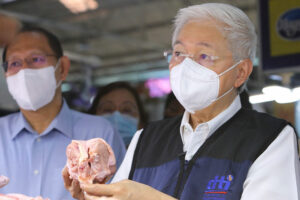The big catch-up

In July 2022, the World Health Organization (WHO) and United Nations Children’s Fund (UNICEF) released global data revealing the largest sustained decline in childhood vaccinations in about 30 years. The percentage of children who received three doses of the vaccine against diphtheria, tetanus and pertussis (DTP3) fell by 5 percentage points between 2019 and 2021 to 81%. The DTP3 vaccination is a marker for immunization coverage within and across countries.
Twenty-five million children missed out on one or more doses of DTP through routine immunization services in 2021 alone, according to the WHO and UNICEF. This was 2 million more than those who missed out in 2020 and 6 million more than in 2019, highlighting the growing number of children at risk from devastating but preventable diseases. About 18 million of the 25 million children did not receive a single dose of DTP during the year, the vast majority of whom live in low- and middle-income countries. India, Nigeria, Indonesia, Ethiopia and the Philippines recorded the highest numbers.
This unprecedented decline in immunization coverage was due to many factors, including an increased number of children living in conflict and fragile settings where immunization access is often challenging. There was also increased misinformation as well as COVID-19 related issues such as service and supply chain disruptions, resource diversion to response efforts and containment measures that limited immunization service access and availability.
In October 2022, the Department of Health (DoH) said the routine immunization coverage among children in the country had dropped to 62.9%. The target coverage for routine immunization among children is 95%. The DoH attributed the decline to vaccine hesitancy and COVID-19 pandemic lockdowns and restrictions. It warned of a possible measles outbreak in the country this year unless urgent steps are taken to increase immunization coverage among children.
Without vaccines, people are at risk of serious illness and disability from diseases like measles, meningitis, pneumonia, tetanus and polio. Many of these diseases can be life-threatening. The WHO estimates that childhood vaccines alone save more than 4 million lives every year. Although some diseases may have become uncommon, the germs that cause them continue to circulate in some or all parts of the world. The WHO warned that in today’s world, infectious diseases can easily cross borders and infect anyone who is not protected.
The key reasons to get vaccinated are to protect ourselves and others. Because not everyone can be vaccinated — including very young babies, those who are seriously ill or have certain allergies — they depend on others being vaccinated to ensure they are also safe from vaccine-preventable diseases, the WHO said.
Vaccines protect against many different diseases, including cervical cancer, cholera, COVID-19, diphtheria, Ebola virus disease, hepatitis B, influenza (flu), Japanese encephalitis, measles, meningitis, mumps, pertussis, pneumonia, polio, rabies, rotavirus, rubella (German measles), tetanus, typhoid, varicella (chickenpox) and yellow fever.
Vaccination is safe and side effects are usually minor and temporary, such as a sore arm or mild fever. More serious side effects are possible but extremely rare. Any licensed vaccine is rigorously tested across multiple phases of trials before it is approved for use, and regularly reassessed once it is introduced. Scientists are also constantly monitoring information from several sources for any signs that a vaccine may cause health risks. People are far more likely to be seriously injured by a vaccine-preventable disease than by a vaccine.
The World Immunization Week, celebrated in the last week of April, aims to highlight the collective action needed and to promote the use of vaccines to protect people of all ages against disease. Under this year’s theme of ‘The Big Catch-Up,’ the DoH and its partners are working to accelerate rapid progress to get back on track to ensure more people, particularly children, are protected from preventable diseases. The ultimate goal of World Immunization Week is for more people — and their communities — to be protected from vaccine-preventable diseases.
Vaccines, indeed, help people of all ages to reach their potential and contribute to social and economic development. Vaccines and vaccine innovation will continue to play a crucial role in helping combat health threats and mitigate the risks from future ones.
Teodoro B. Padilla is the executive director of the Pharmaceutical and Healthcare Association of the Philippines, which represents the biopharmaceutical medicine and vaccine industry in the country. Its members are in the forefront of research and development efforts for COVID-19 and other diseases that affect Filipinos.




